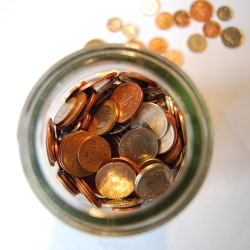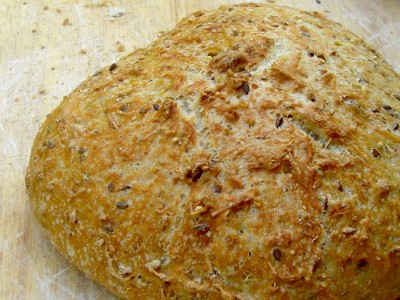Getting ready for winter: insulating jobs to-do list
We moved into our new house at the very end of September last year. The first weekend after we moved in there were gales which felt like they were blowing through the house and then we had the coldest winter in a long time — we very quickly learned how poor the insulation/draught-proofing was here and realised in hindsight how snug our last (considerably smaller) house had been!
I pledged to spend the spring/summer months completing small insulating tasks to get the house ready for winter this year – to save wasting energy and therefore money — but here it is near the end of August and I’ve hardly started, so I think it’s time for a to-do list which will hold me accountable for my actions!
- Check/fix the rubber seals around all the external doors Most of it is there but some of it has fallen off. I’ll restick it into position. As we have a lot of external doors, this should cut down a lot of draughts.
Subtasks:- Find out what glue will be needed
- Buy glue if necessary
Thoughts on Ken Rockwell’s How To Afford Anything
 Already respecting his views on photography, John was interested to find an old article by Ken Rockwell called “How to Afford Anything” a few weeks ago.
Already respecting his views on photography, John was interested to find an old article by Ken Rockwell called “How to Afford Anything” a few weeks ago.
Reading it in parallel, we quickly noted that while there wasn’t anything completely mindblowing for us, it was a mostly excellent article, we agreed with most of it and I would highly recommended reading it regularly. But there are a few points that I disagreed with though and I want to discuss them here. (I’ve quoted random bits of the article so it seems very disjointed but I’ve tried for each quote to make sense within itself.)
Don’t eat out: unless you’re eating off the dollar menu at fast food (as I have always done), cook your own food!
I like food too much to never eat out. We ate out more in the past than we do now but we still eat out once or twice a week. We don’t go to the most expensive restaurants but not the cheapest either: we rarely choose where we’re going based on price.
One thing though: we don’t spend a lot of money on drinks. I don’t drink alcohol and John doesn’t drink wine so we might have a soft drink/beer respectively when we arrive but will then switch onto tap water. We also invariably have better tea & coffee at home than the restaurant can offer so that’s another saving. Not having a restaurant-cheap bottle of wine and after dinner coffees saves us at least £20 a meal – and when the food bill is only £30, that’s quite a “saving”. (Ken does touch on this later.)
I’d class enjoying food as a hobby – I would never spend £2000 on a camera like Ken would, I’d spend it on 200+ curries instead.
Everyone has their own luxuries. Speaking of which:
“A luxury, once sampled, becomes a necessity.”
I personally both agree and disagree with this. Yes, some “luxuries” become necessities (the day I upgraded to a decent bra from budget ones was a special, special day indeed: my perky boobs never looked back) but it’s not always the case – we went on a really expensive (for us) holiday a few years ago but I’ve equally loved holidays since then which have been considerably less glamorous & far-flung – and have cost a tenth of the price. I’m also happy to eat frugal homemade food the rest of the time to pay for those two meals out a week – mostly because our frugal homemade food can be super tasty, but I think I’d feel the same way if it was more humdrum. Well placed luxuries provide variety in life.
Read MoreA few days off
I’ve just had a few days offline to clear my head a bit – I spent a lot of time reading, resting & DSing so it wasn’t as productive as four days off work usually is, but there are a few things to report:
Massive egg update
The supersized chicken egg we got on Monday has been repeated on a few days this week – not a scientific test but definitely more likely to happen after they’ve had a good portion of green treats the day before. We’ve had a couple of them and they’ve been double yolkers – which is a worry as it hints that there is something wrong with the fine lady’s reproductive system (even though they’re still young, I think they’re a bit too old for it to be a “really young and still learning” quirk). Will keep an eye on the situation.
Foraging & fruiting
Took Lily-dog for a long walk around Otley Chevin on Saturday – found the most wild mushrooms I’ve seen in one place but unfortunately didn’t have our identification books with us, doh! Took lots of pictures for post-hoc identification – means we can’t forage them but the identification part is the more important bit at this stage in our learning really.
We also found the dregs of some wild raspberries – so ripe it was hard to pick them because they’d fall off as soon as we went nearly them.
Speaking of which, the bramble bushes in the woods next to our house are just about ready to give up their first glut – John had some as a pre-breakfast snack while dogwalking this morning and declared them delicious. Have to go picking soon.
Read MoreKeeping track of personal finances – how do you do it?
 How do you keep track of your money from day to day?
How do you keep track of your money from day to day?
Considering my love of both frugality and numbers, I don’t actually have a particularly good handle on my finances. I have a rough picture in my head of things – how much my standard incomings/outgoings are, how much I’ve spent in addition to those, how much I have in savings and how much I have on my paid-off-in-full-each-month credit card – and I check my bank balance reasonably regularly so nothing really passes me by — but I’ve been thinking lately that it would be better if that picture was in sharper focus. It’s hard to say how much growing our own food is saving on our food bill or how much an insulation measure saves us on heating unless we know what we’re spending in the first place.
All my accounts are paperless/internet-based and I use finance software as part of my job so it makes sense to manage things on my computer/online – but I’ve not been able to find an app (either online or offline) that does what I need. I’m not asking for the moon on a stick but I want to be able to import statements from my bank, manually create/delete transactions, define categories & assign stuff to them easily, produce useful reports and most importantly, not feel it’s a chore to do (because if it feels like a chore, it won’t get done). I’ve spent a good number of hours over the last couple of days looking into different options but all either had major show-stopping flaws or were that complicated/clunky to use that I would actively prefer to do actual chores than that.
(Offline, on Ubuntu/Linux, I tried GNUCash, Grisbi, KMyMoney and Homebank. Online, I tried Xero Personal & the very US-focused Mint.com. I also tried to try the multi-platform YNAB – You Need A Budget – but the free trial just wouldn’t download for me, no matter what I tried.)
A couple of friends suggested just using a spreadsheet, which I think are great for overall finance planning but would involve a lot of manual data entry work for keeping a track of every transaction — and I want that “every transaction” focus or I won’t have gained anything over my mental map.
Do you use dedicated software, or a spreadsheet, or some other computer-based method? Or do you still keep a track of things on paper? If so, how does that work out for you? Any advice, tips or software recommendations would be gratefully received!
Read MoreBread baking – making efficient use of the oven
Following on from yesterday’s post about my love affair with slow rise/no knead bread, I’ve asked a question on Recycle This today about how to make better use of the oven while baking.
It uses a fair bit of energy (and therefore money) so I want to make sure the process is as efficient as possible.
If you’ve got any suggestions, go post a comment over there!
Read MoreThe wonder that is slow rise bread
Slow rise bread is awesome and here’s my top five reasons why.
1. Slow rise bread is really easy and, waiting aside, quick to make.
While it usually takes about 18 hours from start to finish so requires plenty of forethought if you want it for a particular meal, it only takes about 5-10 minutes of actual involvement and for me, most of that time is cleaning my mixing bowl because I’m too disorganised to do that in advance. That’s less time than it takes us to walk to the shop and back.
2. Slow rise bread tastes great.
The bread produced is not like the super fluffy, disturbingly even stuff from supermarkets; it’s heavier, chewier and the bubbles are bigger and more random. This makes it feel considerably more substantial and less like candy floss. You don’t need to eat as much to feel full.
3. Slow rise bread lasts longer than shop-bought bread.
Probably because of the heavier, chewier texture, it doesn’t feel stale anywhere near as fast as supermarket bread. Fresh-baked (rather than pre-packed) supermarket bread always seems to dry out really quickly and by the second day, needs heating in the oven/toasting to be enjoyable. Our slow rise bread is still good to eat on day three or four (although it rarely lasts that long). We waste far less bread/bread products these days.
4. Slow rise bread is cheap to make.
A loaf of the “fancy” stuff from the bread counter in a supermarket usually costs £1-ish — or more if you get their version of an artisan loaf. Even using reasonably fancy flour, my loaves cost about 30p (excluding energy for baking). I suspect I could push this down quite a lot by buying in bulk.
5. Slow rise bread saves money in other ways.
But more than just the cost of the loaf itself, we’ve saved loads of money not going to the supermarket every other day to pick up fresh bread. Because when we were there, we never just brought the bread – we’d pick up other bits and bobs, most of which were treats or other unnecessary purchases.
Easy, tasty & frugal – really, what more could you want from a loaf?






